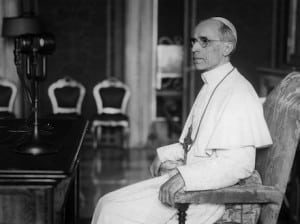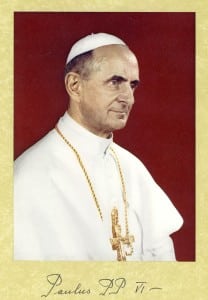NFP and Serious Reasons…What are these reasons?
Do you need a reason to morally practice NFP or Naturally Family Planning? My post about the sinfulness of contraception and sterilization (Read: 6 Reasons Why Contraception is Sinful) stirred up some comments about natural family planning (NFP). Some have claimed that NFP is abused just as much as artificial contraception. So today we’ll look at NFP and the Catholic Church’s serious reasons or just causes for NFP.
In this post we’ll look at the teaching of Pope Pius XII and Pope Paul VI on the reasons for NFP. I’ll also share some personal thoughts about it all.
Natural Family Planning (NFP) is a popular contemporary term for “periodic continence.” NFP works by observing the cycles of a wife’s fertility (charting oral temperatures, measuring cycle length, and journaling interior fertility signs), and then avoiding the nuptial embrace during her times of fertility so as to avoid pregnancy. In NFP, the husband and wife abstain from the nuptial embrace altogether during the time of the wife’s monthly fertility (usually 7-12 days).

The Church allows married couples to practice periodic continence only for what the church calls “serious” or “just” reasons. These reasons were listed by Pope Pius XII in his “Address to the Italian Catholic Union of Midwives” from 1951. Granted, a popes address to “Italian midwives” is low on the the pole when it comes to magisterial statements. It’s not a universal statement. Nevertheless, it’s helpful to begin our investigation here.
Pope Pius XII NFP Serious List (1951)
Pope Pius XII’s list from his “Address to the Italian Catholic Union of Midwives” in 1951:
Serious motives, such as those which not rarely arise from medical, eugenic, economic and social so-called “indications,” may exempt husband and wife from the obligatory, positive debt for a long period or even for the entire period of matrimonial life.”
Pope Pius XII gives us these four reasons:
- Medical reasons
- Eugenic reasons
- Economic reasons
- Social “indicator” reasons
Pope Paul VI NFP Serious List (1968)
 Seventeen years later, the serious reasons (seriis causis) were repeated by Pope Paul VI in his groundbreaking encyclical Humanae Vitae.
Seventeen years later, the serious reasons (seriis causis) were repeated by Pope Paul VI in his groundbreaking encyclical Humanae Vitae.
With regard to physical, economic, psychological and social conditions, responsible parenthood is exercised by those who prudently and generously decide to have more children, and by those who, for serious reasons and with due respect to moral precepts (seriis causis moralibusque praeceptis observatis), decide not to have additional children for either a certain or an indefinite period of time.” (Humanae Vitae, 10).
Here Pope Paul VI mentions “serious reasons” (seriis causis) with four kinds of conditions:
- Physical conditions
- Economic conditions
- Psychological conditions
- Social conditions
It seems that Pope Paul VI has in mind the four reasons listed by Pope Pius XII with the additional help of “psychological” and the omission of “eugenic.” However, we can discern that medical, eugenic, and psychological belong to the one “medical” genus of reason/condition/cause.
I think we can simplify the lists of both pontiffs without doing injustice to either.
NFP Serious Reasons List: Simplified and Harmonized
- Physical conditions (including “Medical,” “Psychological,” and “Eugenic”)
- Economic conditions
- Social conditions
Note that NFP or “periodic continence” in itself is morally neutral since observing a woman’s cycle and remaining continent are morally neutral. Therefore, NFP is not intrinsically evil. Artificial contraception (condoms, the pill, interuptus) are intrinsically evil because they directly intervene in the natural process. Artificial contraception obstructs the natural act either through devices, chemicals, or direction intervention. So then, NFP can be used when there is a proper “serious” circumstance, and the Holy Father provides four such circumstances. Let’s go through these four grave reasons.
1. Physical (Medical, Psychological, and Eugenic) Medical reasons for NFP would prudently weigh whether the mother’s life is in jeopardy or whether a circumstance would endanger the newly conceived child’s life (eg, the mother is going through chemotherapy or other treatment that would damage or kill a newly conceived baby). In regard to serious medical reasons, Pope Paul VI, in Humanae Vitae n. 16, also spoke of “reasonable grounds for spacing births, arising from the physical or psychological condition of husband or wife.”
The Catholic Church recognizes that psychological problems are serious. This might include not only the mother’s mental health, but also the father’s mental health. If either parent is depressed, schizophrenic, suicidal, etc. parents should prayerfully delay pregnancy “with due respect to moral precepts.” For more on “Catholic parent mental break down,” please check out my post on GBS: George Bailey Syndrome.
With regard to what Pius XII calls “eugenics,” if the couple would pass on dangerous birth defects or perhaps has a history of serial miscarriages, then parents might prayerfully delay pregnancy “with due respect to moral precepts.” Jennifer Fulwiler has an excellent post on NFP and her own personal experience with NFP, medical problems, her babies, and “hope vs. risk.”
2. Economic (Poverty and Debt) Economic reasons touch on whether the married couple is too poor to provide for a new child. Obviously, an economic “serious reason” does not to the inability to pay for fishing boats, fancy prep schools, a new hunting rifle, or Lilly Pulitzer diaper bags. We’re talking about falling below the poverty line within one’s culture. There is no point in comparing poverty in one nation to poverty in another. It depends on where you live. A family earning $20,000 in the United States would be “rich” in Indonesia – but they don’t live in Indonesia. They live in America! American parents must buy minivans, pay the mortgage, buy clothes, and provide religious education in America at American prices. So we shouldn’t say, “Even poor Americans are richer than central Africans, therefore, poor Americans can’t have recourse to NFP.
If a married couple are subsisting on government assistance, then they should delay pregnancy “with due respect to moral precepts.” There is one element missing from today’s discussion on Catholic marriage and family and that is debt.
Financial debt is a grave evil. The Bible often speaks of the danger of personal debt:
“The rich rules over the poor, and the borrower is servant to the lender.” (Proverbs 22:7)
Young people often entangle themselves in debt, and I personally believe that debt is the #1 reason for young people today avoid marriage. If 25-year old Tom has $18,000 in credit card debt and $45,000 in college debt, and 22-year old Sally has $5,000 in credit card debt and $52,000 in college debt, then they would begin their married life with $120,000 of debt! That doesn’t even include a mortgage. It’s a difficult subject, but my personal belief is that priest should not marry people with large debt amounts.
We don’t allow people to enter the priesthood or religious orders with stacks of debt, why then should we allow people to enter into a the sacrament of marriage burdened with debt. It’s hard to fulfill the vocation of having a large Catholic family if you begin with piles of debt. Nevertheless, some financially prudent couples find themselves drowning in debt for no fault of their own – often with insurmountable medical expenses for themselves or for their children. This is an economic evil and such families might consider the delaying pregnancy through NFP.
3. Social (Upheaval and Persecution) The Holy Father refers here to social disorder. Social disorder doesn’t include, “the Democrats won the Presidency again.” Social disorder refers to serious problems in which raising children would be almost impossible: Concentration camps. Religious persecution. Forced relocation. Famines. Living under China’s one child policy.
The growth of a family presumes a natural habitat for the family to flourish. When this habitat is removed or destroyed, it is not prudent to introduce children into the world. If a Chinese mother must worry about forced abortions for her next pregnancy, clearly this is a serious cause! No one would fault her for using NFP.
My Thoughts on the “Big Catholic Family”
Disclaimer: We have eight children. Do I ever get nervous about having more? Yes, I do. Does the thought of ten children sometimes scare me? Yes, it does. However, I try to make a trustful surrender of my will to God’s will. When we had five children, all we had to be reminded of is the fact that:
- St Thomas Aquinas was number six in his family.
- St Therese de Lisieux (Doctor of the Church) was the ninth of nine children.
- St Gabriel Possenti (patron of handgun owners!) was number 11.
- St Catherine of Sienna (Doctor of the Church) was number 23!
- Saint Pius X was number 2 of 9 children.
We should be grateful to these saints, but also to their parents who were sacrificial in their generosity.
So, yes, it can be worrisome and scary. Yet God will always equip you with new graces. Earthly life is short. Eternal life is everlasting. Can you imagine having the everlasting glory in heaven for having been the parent of St Therese of Lisieux? What joy her parents must now experience.
St Basil the Elder and his wife St Emelia had nine children – five of which are canonized saints! So you never know. Trustful surrender. It won’t be easy, but it will be full of joy – both in this life and in the world to come!
Please also explore Taylor’s books about Catholicism at amazon.com.
What to Watch Next
SHOP THE TAYLOR MARSHALL STORE
Dive Deeper

GET CONFIDENT IN YOUR FAITH
Explore the fascinating world of Catholic teachings with Dr. Marshall. Together you’ll unpack the brilliant answers the Church gives to tough questions about the Faith. The best part: you go at your own pace. Start this exciting journey today.


 >
>



